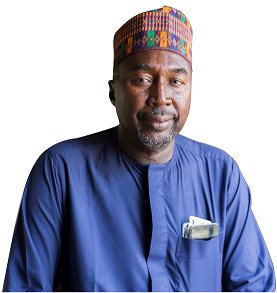
Mr. ZannahMustapha, is a lawyer and human rights advocate, whois one of those who brokered the release of Chibokschool girls taken hostage by Boko Haram and a provider of educational opportunities to children who are victims ofthe insurgency in north-eastern Nigeria.Heopened a school in Maiduguri –the epicenter of the Boko Haram insurgencyin 2007, as the devastated conditions of the people changed his course from law to a philanthropy.
The school is essentially his personal orphanage that provides care and free education for children who lost their parents from either sides of the Boko Haram insurgency. Apart from free education, the school provides free meals, uniforms and healthcare to children affected by violence.
The conflict with Boko Haram has produced many orphans on either side and they are all welcome into Mustapha’s classrooms. By this move, he raised hopesand created a chance for reconciliation in the region.
Education is recognized as a powerful tool for helping refugee children overcome the horrors of violence and forced displacement. It countersattempts to exploit and recruitment young people intoinsurgent groups. Schools constitute the engine of society’s advancement and offer the opportunity for the next generation to succeed.
Mustapha is therefore on an importance mission to rebuild communities in north-eastern Nigeria and foster peaceful coexistence that denominates hope and progress. His effort in providing education to orphans and vulnerable children has been described as an extraordinary humanitarian work centered on displaced children caught in the web of violence in north-eastern Nigeria.
His first school – Future Prowess Islamic Foundation, provides free education for hundreds of students and thousands on the waiting list. He opened a second school in 2016, which has witnessed rapid growth in children enrollment. Increasing the capacity is in effort to cope in the region in which in one way or the other everyone there is a victim of theBoko Haram insurgency and needs a lifeline and a fresh chance in life.
Mustapha’s school is open toChristian and Muslim families from both sides of the conflict and offers Islamic and Western education. There are no background boundary restrictions; instead hands of friendship are extended toboth sides of the conflict.Thisprovided a rare opening that made Mustaphaa right and proper person to mediate in the release of Chibok schoolgirls, abducted by Boko Haram in 2014.
Mustapha is on a venture to give help to orphans in communities where they are counted in their thousands.He began the journey before the conflict escalated and when in his wildest dreams, he never imaginedthe situation could reach the overwhelming stage now in his hands.
He was inspired to act in order to fill a gap of neglect of children’s educational needs, especially those of girls. To him, itis a duty owed by everyone to give supportive services to less privileged and vulnerable children, particularly the orphans.
The insurgency escalatedin 2009and do did the number of widows and orphans that needed help. Mustapha increased the scope of his operation to include widows and children of Boko Haram suspects killed in the conflict, asthey might not even be fully aware of what their parents or husbands were into before they got killed.

Their inclusion provided a turning point for the widows and their children, according toMustapha.The interventioninvolves various lifelines, including skills acquisition programmes and other forms of economic empowerment.
Being at the receiving end of conflict, Mustapha could see how government’s change of approach from crushing Boko Haram to dialoguing with them helped to set the Chibok school girls free. It is, in his view the icebreaker. Muting the idea of dialoguing with the insurgent was entirely a humanitarian move, according to Mustapha. “What I did was truly patriotic and it was something that can be measured in terms of honesty, dedication and loyalty to own country”, he said in an interview.
Mustapha isn’t just a humanitarian, who works to address human miseries but a philanthropist, who seeks the elimination of the fundamental causes of human suffering. He is seeking a holistic approach that should put on the tablehow to proceed from rescuing of hostages in the Boko Haram camp to ending the insurgency.
He expects that the next time the government gets a chance to interface with the insurgents, what needs to be on the table should be the cessation of hostility, protection of civilians’ lives and stoppage of suicide bombings.
Mustapha considers true victory over insurgency as the ability to transform to a level where the insurgents decide to drop their arms completely.Setting the agenda in the event of another interface with Boko Haram, Mustapha expects thata complete end to the conflict should be on the table.
Protection of civilians, includingmany still in captivity, should be on the agenda, according to him. In his view, total stoppage of suicide bombings should also be a top item on the agendain exchange of some form of safe corridor for the terrorists.


